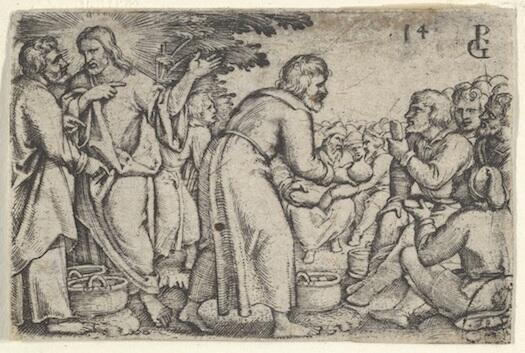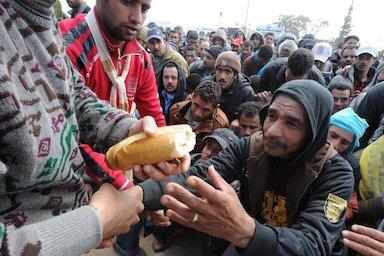 This Sunday (June 14) is the Feast of Corpus Christi, the Body (and Blood) of Christ. It is the last Sunday feast in the long double season that began with Lent. Next Sunday we are back in what is called Ordinary Time. It is also the official start of the Archdiocesan Year of the Eucharist, which ends next year with the same feast (June 3, 2021). In case you’d not read it before, you can find the Cardinal’s Letter on the theme of the year here.
This Sunday (June 14) is the Feast of Corpus Christi, the Body (and Blood) of Christ. It is the last Sunday feast in the long double season that began with Lent. Next Sunday we are back in what is called Ordinary Time. It is also the official start of the Archdiocesan Year of the Eucharist, which ends next year with the same feast (June 3, 2021). In case you’d not read it before, you can find the Cardinal’s Letter on the theme of the year here.
Tarnished a little by the oddly out of time and place photo of a priest saying Mass with his back to the people, it is however a fine letter, with a fine theme:
Recent times have been very difficult for the Church and her people. In the Year of the Eucharist, we all have the opportunity to renew and strengthen our faith and our closeness to the Lord. If we center ourselves in the Real Presence of Jesus, in His friendship, then everything else will make sense. At the celebration of Mass, Jesus is there, waiting for us, inviting us to the table where He is making a gift of Himself to us so that we may have the strength to make a gift of ourselves to others. That is what human fulfillment is about. It is about love and giving of ourselves on behalf of others. That is the meaning of the Eucharist, it is love taken to the extreme. The more we understand that, the more we will want to be present to the Eucharist and the more the Eucharist will transform us.
It is sad, ironic, but perhaps providential then that as this special year begins, we are quite far removed from traditional expectations about the Eucharist, real presence and communion. For months we have not been gathering for the Eucharist; most of us have been unable to receive communion; few are able to visit the Blessed Sacrament; even now, as parishes start having Masses again, these Masses are uneasy and on edge, hedged in with rules that make Eucharistic community rather arduous. On this feast, we are still a distanced, scattered people.
But the bread of life is not bread just for comfortable times, but a gift from God, of God, that helps us to cross over death to life. As Jesus puts it in John 6, today’s Gospel, in words spoken after he multiplies loaves and fishes to feed the women and men who had gathered to hear him:
I am the bread of life. Your ancestors ate the manna in the wilderness, and they died. This is the bread that comes down from heaven, so that one may eat of it and not die. I am the living bread that came down from heaven. Whoever eats of this bread will live forever; and the bread that I will give for the life of the world is my flesh.” (John 6.48-51)
Jesus’ reference to the wilderness and the manna draws us back to a memory ancient already even in the time of Jesus: God’s providing for his people even in the desert, when they were hungry, when they faced an uncertain future. That bread from heaven is not just for settled people, people at peace is a theme recurring in scripture. Think of the Jewish people, at the time of leaving Egypt making do with quickly made unleavened bread (Exodus 11); the manna God provided for the people in the desert (Exodus 16); the raven who brings food and drink to Elijah during his exile (I Kings 17); God providing food in the desert for Mary (Qur’an, Surah 19):
So Mary conceived her son and withdrew with him to a place far off. And the pangs of childbirth drove her to the trunk of a date palm. She said, "Would that I had died before this and was a thing forgotten, utterly forgotten!" So he called out to her from below her, "Grieve not! Thy Lord has placed a rivulet beneath thee. And shake toward thyself the trunk of the date palm; fresh, ripe dates shall fall upon thee. So eat and drink and cool thine eye. (19: 22-26a; Study Qur’an tr.)
As is most often the case in the Torah, the message of Moses in Deuteronomy 8, from which today’s first reading is drawn, is wonderfully concrete, down to earth:
This entire commandment that I command you today you must diligently observe, so that you may live and increase, and go in and occupy the land that the Lord promised on oath to your ancestors. Remember the long way that the Lord your God has led you these forty years in the wilderness, in order to humble you, testing you to know what was in your heart, whether or not you would keep his commandments. He humbled you by letting you hunger, then by feeding you with manna, with which neither you nor your ancestors were acquainted, in order to make you understand that one does not live by bread alone, but by every word that comes from the mouth of the Lord.
The clothes on your back did not wear out and your feet did not swell these forty years. Know then in your heart that as a parent disciplines a child so the Lord your God disciplines you. Therefore keep the commandments of the Lord your God, by walking in his ways and by fearing him. For the Lord your God is bringing you into a good land, a land with flowing streams, with springs and underground waters welling up in valleys and hills, a land of wheat and barley, of vines and fig trees and pomegranates, a land of olive trees and honey, a land where you may eat bread without scarcity, where you will lack nothing, a land whose stones are iron and from whose hills you may mine copper. You shall eat your fill and bless the Lord your God for the good land that he has given you. (Deuteronomy 8:1-10)
 Word and/as bread: Feeding, clothing, protecting, guiding a desperate pilgrim people, refugees in the desert; a word, promise, of being-with the people: this is the bread from heaven that we remember this year, in the Eucharist and in every other place too.
Word and/as bread: Feeding, clothing, protecting, guiding a desperate pilgrim people, refugees in the desert; a word, promise, of being-with the people: this is the bread from heaven that we remember this year, in the Eucharist and in every other place too.
2020 is a year of environmental disaster, pandemic, the collapse of civility in society, and the hateful poison of racism once again showing its ugliness and malevolence, hurting the most vulnerable in our society — and in ways many of us cannot see, because we happen to be safe, at a distance. Yet we all know something is wrong. The New York Times on June 12 reported the sense of unease and even dread pervading American society, with this paragraph capturing the essence of the matter:
Five months from a crucial presidential election, the usual political debates, campaign events and policy fights have faded into the background for voters battered by a public health crisis, struggling through an economic recession and boiling over with fury over racial inequities. With tens of millions unemployed, more than 110,000 killed by the coronavirus and thousands of people protesting in the streets, Americans see their personal concerns and political choices through a strikingly existential lens — mourning the past, worried about the present and fearful of the future. (Lisa Lerer and David Umhoefer)
What shall our country be like by the end of the Eucharistic year next June? We do not know.
So in this time of life and death, perhaps it is best to retrieve another old Catholic term related to the Eucharist: viaticum:
The word viaticum is a Latin word meaning "provision for a journey," from via, or "way". Viaticum can refer to an ancient Roman provision or allowance for traveling, originally of transportation and supplies, later of money, made to officials on public missions; mostly simply, the word, a haplology of viā tēcum ("with you on the way"), indicates money or necessities for any journey…
In Catholic tradition, viaticum is communion brought to the dying, food for the journey through death and new life:
For Communion as Viaticum, the Eucharist is given in the usual form, with the added words "May the Lord Jesus Christ protect you and lead you to eternal life". The Eucharist is seen as the ideal spiritual food to strengthen a dying person for the journey from this world to life after death. (Wikipedia)
We need viaticum for 2020, God-with-us-as-our-nourishment-on-the-road. The promise of today’s feast is that Christ is with us wherever we are, nourishing us with daily bread for the next steps in the journey of the weeks and months ahead. If we keep moving and do not settle for comfortable old ways and not blind ourselves to the suffering around us, God will keep feeding us, present and life-nourishing. So let us accept the reality of our times in this year of the Eucharist. We can seek to live out the Cardinal’s words: the Eucharist is about love, about giving of ourselves on behalf of others — a love taken to the extreme. Even when we do not have bread, we live out that presence of Christ in our bodies, our words, our deeds.
 For listening: There is a beautiful sequence for Corpus Christi, a long hymn inserted after the second reading and before the Gospel: Praise Sion (Lauda Sion). It is a long theological reflection on the meaning of the Eucharist, by St. Thomas Aquinas, the great medieval theologian. It is of course greatly in need of reinterpretation today, but it remains a beautiful hymn. Try this version with subtitles. The short and even more beautiful Bread of Angels (Panis Angelicus), taken from a longer hymn by Aquinas, also speaks to our feast. You can find settings here and here.
For listening: There is a beautiful sequence for Corpus Christi, a long hymn inserted after the second reading and before the Gospel: Praise Sion (Lauda Sion). It is a long theological reflection on the meaning of the Eucharist, by St. Thomas Aquinas, the great medieval theologian. It is of course greatly in need of reinterpretation today, but it remains a beautiful hymn. Try this version with subtitles. The short and even more beautiful Bread of Angels (Panis Angelicus), taken from a longer hymn by Aquinas, also speaks to our feast. You can find settings here and here.

